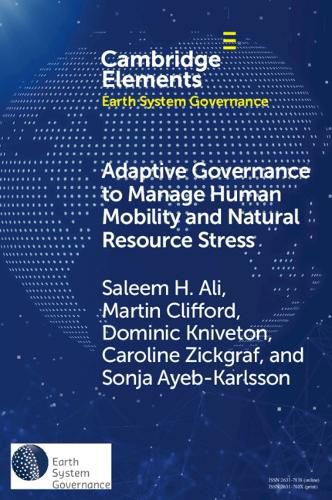Adaptive Governance to Manage Human Mobility and Natural Resource Stress
Saleem H. Ali, Martin Clifford, Dominic Kniveton, Caroline Zickgraf, Sonja Ayeb-Karlsson

Adaptive Governance to Manage Human Mobility and Natural Resource Stress
Saleem H. Ali, Martin Clifford, Dominic Kniveton, Caroline Zickgraf, Sonja Ayeb-Karlsson
Connections between resources and migration operate as a complex adaptive system rather than being premised in linear, causal mechanisms. The systems thinking advocated within this Element increases the inclusion of socio-psychological, financial, demographic, environmental and political dimensions that mediate resource-(im)mobility pathways. The Earth Systems Governance paradigm provides a way to manage global migration flows more effectively, allowing for consideration of networks and interdependencies in addition to its inherent adaptiveness. Resource rushes, hydropower displacement, and climate-induced retreat from coastal areas are all examples of circumstances linking resources and human mobility. Movement can also ameliorate environmental conditions and hence close monitoring of impacts and policies which harness benefits of migration is advocated. Green remittance bonds, and land tenure policies favoring better arable resource usage are key ingredients of a more systems-oriented approach to managing mobility. The Global Compact on Migration offers an opportunity to operationalize such adaptive governance approaches in the Anthropocene.
This item is not currently in-stock. It can be ordered online and is expected to ship in approx 2 weeks
Our stock data is updated periodically, and availability may change throughout the day for in-demand items. Please call the relevant shop for the most current stock information. Prices are subject to change without notice.
Sign in or become a Readings Member to add this title to a wishlist.


